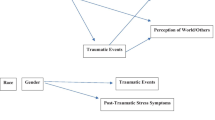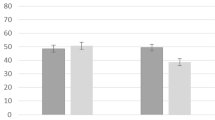Abstract
Emergency service personnel, such as police officers, firefighters and paramedics, often take part in Critical Incident Stress Debriefing (CISD; Mitchell, 1983) following exposure to traumatic events. However, there is evidence that these group debriefing sessions may actually increase the risk of PTSD and permanently distort the participants' memories for the events. This study compared the impact of two different elements of CISD on recall for an event and psychological well-being. In pairs, undergraduate students unknowingly viewed slightly different versions of a stressful video. Participants were then randomly allocated to one of three conditions: emotion-focused debriefing, fact-focused debriefing, or no debriefing. Participants who received fact-focused debriefing incorporated more misinformation into memory and also reported more intrusive thoughts about the video than the controls. Participants who received emotion-focused debriefing reported more confabulated items than participants in the control condition and reported more intrusive thoughts. These findings suggest that some aspects of CISD may be problematic. Therefore, it may be important to work toward the development of new, more effective post-trauma interventions.



Similar content being viewed by others
References
Berger W, Coutinho ESF, Figueira I, Marques-Portella C, Luz MP, Neylan TC, Mendlowicz MV (2012) Rescuers at risk: a systematic review and meta-regression analysis of the worldwide current prevalence and correlates of PTSD in rescue workers. Social psychiatry and psychiatric epidemiology 47:1001–1011
Berntsen D, Willert O, Rubin DC (2003) Splintered Memories or Vivid Landmarks? Qualities and Organization of Traumatic Memories with and Without PTSD. Applied Cognitive Psychology 17:675–693
Bisson JI, Jenkins PL, Alexander J, Bannister C (1997) Randomised controlled trial of psychological debriefing for victims of acute burn trauma. British Journal of Psychiatry 171:78–81
Brewin CR, Andrews B, Rose S, Kirk M (1999) Acute Stress Disorder and Posttraumatic Stress Disorder in Victims of Violent Crime. American Journal of Psychiatry 156(3):360–366
Devilly GJ, Gist R, Cotton P (2006) Ready! Fire! Aim! The Status of Psychological Debriefing and Therapeutic Interventions: In the Work Place and After Disasters. Review of General Psychology 10(4):318–345
Devilly GJ, Varker T (2008) The effect of stressor severity on outcome following group debriefing. Behaviour Research and Therapy 46(1):130–136
Devilly GJ, Varker T, Hansen K, Gist R (2007) An analogue study of the effects of Psychological Debriefing on eyewitness memory. Behaviour Research and Therapy 45:1245–1254
Everly GS, Mitchell JT (1995) Prevention of work-related posttraumatic stress: The critical incident stress debriefing process. In: Murphy LR, Hurrell JJ Jr, Sauter SL, Keita GP (eds) Job stress interventions. American Psychological Association, Washington DC, pp 173–183
Foa EB, Kozak MJ (1986) Emotional processing of fear: Exposure to corrective information. Psychological Bulletin 99:20–35
Gabbert F, Memon A, Allan K, Wright D (2004) Say it to my face: Examining the effects of socially encountered misinformation. Legal and Criminological Psychology 9(2):215–228
Gabbert F, Memon A, Allan K (2003) Memory Conformity: Can Eyewitnesses Influence Each Other’s Memories for an Event? Applied Cognitive Psychology 17:533–543
Gabbert F, Hope L (2013) Suggestibility and memory conformity. In: Ridley AM, Gabbert F, La Rooy DJ (eds) Suggestibility in Legal Contexts: Psychological Research and Forensic Implications. Wiley-Blackwell, London, pp 63–84
Graaugard PK, Holgerson K, Eide H, Finset A (2005) Changes in physician-patient communication from initial to return visits: a prospective study in a haematology outpatient clinic. Patient Education and Counselling 57:22–29
Granhag A, Memon A, Gabbert F, Allwood CM (2004) Contagious contacts: How police trainees influence each other's memories for a criminal event. Paper presented at the 14th European Conference on Psychology and Law, Krakow, Poland
Harris CB, Paterson HM, Kemp RI (2008) Collaborative recall and collective memory: What happens when we remember together? Memory 16:213–230
Horowitz MJ, Wilner NR, Alvarez W (1979) Impact of Event Scale: a measure of subjective stress. Psychosomatic Medicine 41:768–781
Litz BT, Gray MT, Bryant RA, Adler AB (2002) Early Interventions for trauma: Current Status and Future directions. Clinical Psychology: Science and Practice 9(2):112–134
Loftus EF (2005) Planting misinformation in the human mind: A 30-year investigation of the malleability of memory. Learning & Memory 12:361–366
Loftus EF, Donders K, Hoffman HG, Schooler JW (1989) Creating new memories that are quickly accessed and confidently held. Memory & Cognition 17:607–616
Mayou RA, Ehlers A, Hobbs M (2000) Psychological debriefing for road traffic accident victims: Three-year follow-up of a randomised controlled trial. British Journal of Psychiatry 176:589–593
McNally RJ, Bryant RA, Ehlers A (2003) Does early psychological intervention promote recovery for post traumatic stress? Psychological Science in the Public Interest 4(2):45–79
Miller L (2006) Practical police psychology. Charles C. Thomas, Publisher, Springfield, IL
Mitchell JT (1983) When disaster strikes: The critical incident stress debriefing process. Journal of Emergency Medical Services 8:36–39
Monds LA, Paterson HM, Whittle K (2013) Can warnings decrease the misinformation effect in post-event debriefing? International Journal of Emergency Services 2:49–59
NICE (2005) Post-traumatic stress disorder (PTSD): The management of PTSD in adults and children in primary and secondary care. (Full Clinical Guideline 26 Developed by the National Collaborating Centre for Mental Health). National Institute for Health and Clinical Excellence, London
Ost J, Green E, Cherryman J (2004) Are three heads better than one? Police officers' and students' reports of a video-presented criminal event. Poster session presented at the 14th European Conference on Psychology and Law, Krakow, Poland
Paterson HM, Kemp RI (2005) Co-witness discussion: A survey of police officers' attitudes, knowledge, and behaviour. Psychiatry, Psychology and Law 12(2):424–434
Paterson HM, Kemp RI (2006) Comparing Methods of Encountering Post-Event Information: The Power of Co-Witness Suggestion. Applied Cognitive Psychology 20(8):1083–1099
Paterson HM, Kemp R, McIntyre S (2011a) Can a witness report hearsay evidence unintentionally? The effects of discussion on eyewitness memory. Psychology, Crime and Law. doi:10.1080/1068316X.2010.510117, First published on: 28 February 2011 (iFirst)
Paterson H, Kemp R, Ng J (2011b) Combating co-witness contamination: Attempting to decrease the negative effects of discussion on eyewitness memory. Applied Cognitive Psychology 25:43–52
Rose S, Bisson J, Wessely S (2003) A Systematic Review of Single-Session Psychological Interventions (‘Debriefing’) following Trauma. Psychotherapy and Psychosomatics 72(4):176–184
Rose S, Bisson J, Churchill R, Wessely S (2006) Psychological debriefing for preventing post traumatic stress disorder (PTSD). In: Cochrane Review (ed) The Cochrane Library, Issue 3, 2006. Update Software, Oxford
Seaman MA, Levin JR, Serlin RC (1991) New developments in pairwise multiple comparisons: Some powerful and practicable procedures. Psychological Bulletin 3:577–586
Spielberger CD (1984) State-Trait Anxiety Inventory: A comprehensive bibliography. Consulting Psychologists Press, Palo Alto, CA
Sundin EC, Horowitz MJ (2002) Impact of Event Scale: psychometric properties. British Journal of Psychiatry 180:205–209
Wells GL, Malpass RS, Lindsay RCL, Fisher RP, Turtle JW, Fulero SM (2000) From the lab to the police station: A successful application of eyewitness research. American Psychologist 55:581–598
Williams HL, Conway MA, Cohen G (2008) Autobiographical memory. In: Cohen G, Conway MA (eds) Memory in the Real World, 3rd edn. Psychology Press, Hove, UK, pp 21–90
Wright DB, Self G, Justice C (2000) Memory conformity: Exploring misinformation effects when presented by another person. British Journal of Psychology 91:189–202
Zigmond AS, Snaith RP (1983) The hospital anxiety and depression scale. Acta Psychiatrica Scandinavica 67:361–370
Acknowledgments
A special thanks to Michelle Moulds for her helpful and insightful comments on our manuscript. This research was supported by an Australian Research Council Linkage Grant (LP0989719).
Author information
Authors and Affiliations
Corresponding author
Rights and permissions
About this article
Cite this article
Paterson, H.M., Whittle, K. & Kemp, R.I. Detrimental Effects of Post-Incident Debriefing on Memory and Psychological Responses. J Police Crim Psych 30, 27–37 (2015). https://doi.org/10.1007/s11896-014-9141-6
Published:
Issue Date:
DOI: https://doi.org/10.1007/s11896-014-9141-6




